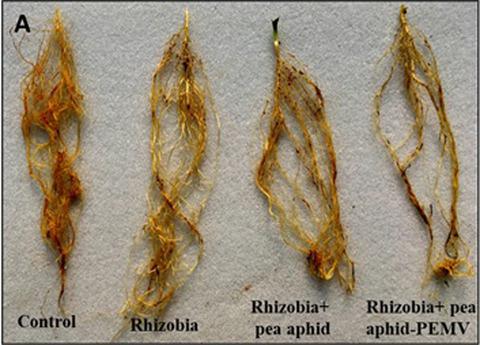当前位置:
X-MOL 学术
›
Funct. Ecol.
›
论文详情
Our official English website, www.x-mol.net, welcomes your
feedback! (Note: you will need to create a separate account there.)
Reciprocal plant-mediated antagonism between a legume plant virus and soil rhizobia
Functional Ecology ( IF 4.6 ) Pub Date : 2021-05-13 , DOI: 10.1111/1365-2435.13828 Saumik Basu 1 , Robert E. Clark 1 , Robert Blundell 2, 3 , Clare L. Casteel 2, 3 , Akaisha M. Charlton 1 , David W. Crowder 1
中文翻译:

豆科植物病毒与土壤根瘤菌之间的相互植物介导的拮抗作用
更新日期:2021-05-13
Functional Ecology ( IF 4.6 ) Pub Date : 2021-05-13 , DOI: 10.1111/1365-2435.13828 Saumik Basu 1 , Robert E. Clark 1 , Robert Blundell 2, 3 , Clare L. Casteel 2, 3 , Akaisha M. Charlton 1 , David W. Crowder 1
Affiliation

|
- Beneficial plant-associated soil microbes can promote plant tolerance to stress and promote nutrient uptake. Yet, the benefits of microbes for plant health can be altered by above-ground stressors like herbivores and pathogens. However, few studies have assessed reciprocal plant-mediated interactions between beneficial soil microbes and multiple above-ground stressors.
- We assessed if soil rhizobia influenced complex interactions among pea host plants, a vector herbivore (aphids) and a plant virus (Pea enation mosaic virus, PEMV). We also examined how aphids and PEMV affected the function of soil rhizobia.
- We show that plants attacked by PEMV produced fewer root nodules and had lower fresh root nodule biomass per g of fresh plant root biomass, and decreased expression of genes associated with nodulation, suggesting PEMV inhibited nitrogen fixation by rhizobia. However, soil rhizobia decreased aphid abundance and PEMV titre on host plants, such that rhizobia decreased the susceptibility of plants to herbivores and pathogens.
- Assays of amino acids, and gene expression related to hormone signalling, show interactions among rhizobia, plants, aphids and PEMV were mediated by plant defence and nutrients. Viruliferous aphids induced salicylic acid in plants, and salicylic acid suppressed the function of rhizobia. Aphids feeding on plants grown in rhizobia-inoculated soil also obtained fewer essential amino acids than those feeding on plants grown in un-inoculated sterilized soil.
- Mutually antagonistic plant-mediated interactions between soil microbes and above-ground stressors affected plant susceptibility and herbivore nutrient uptake. This suggests ecological effects of soil microbes and above-ground stressors for plant health will likely vary based on multi-trophic plant-mediated interactions among herbivores, pathogens and soil microbes.
中文翻译:

豆科植物病毒与土壤根瘤菌之间的相互植物介导的拮抗作用
- 有益的植物相关土壤微生物可以促进植物对胁迫的耐受性并促进养分吸收。然而,微生物对植物健康的好处可能会被食草动物和病原体等地上压力因素改变。然而,很少有研究评估有益土壤微生物与多种地上压力源之间的相互植物介导的相互作用。
- 我们评估了土壤根瘤菌是否影响豌豆寄主植物、载体草食动物(蚜虫)和植物病毒(豌豆花叶病毒,PEMV)之间的复杂相互作用。我们还研究了蚜虫和 PEMV 如何影响土壤根瘤菌的功能。
- 我们表明,受 PEMV 攻击的植物产生较少的根瘤,每克新鲜植物根生物量具有较低的新鲜根瘤生物量,并且与根瘤相关的基因表达降低,表明 PEMV 抑制了根瘤菌的固氮。然而,土壤根瘤菌降低了寄主植物上的蚜虫丰度和 PEMV 滴度,从而降低了植物对食草动物和病原体的易感性。
- 氨基酸分析和与激素信号相关的基因表达表明,根瘤菌、植物、蚜虫和 PEMV 之间的相互作用是由植物防御和营养物质介导的。带毒蚜虫诱导植物产生水杨酸,而水杨酸抑制根瘤菌的功能。以在接种根瘤菌的土壤中生长的植物为食的蚜虫也比以未接种的无菌土壤中生长的植物为食的蚜虫获得更少的必需氨基酸。
- 土壤微生物和地上压力源之间相互拮抗的植物介导的相互作用影响了植物的易感性和食草动物的养分吸收。这表明土壤微生物和地上压力源对植物健康的生态影响可能会因食草动物、病原体和土壤微生物之间多营养植物介导的相互作用而异。











































 京公网安备 11010802027423号
京公网安备 11010802027423号